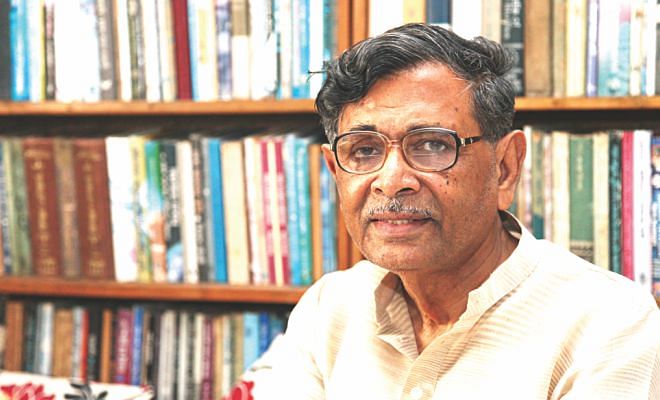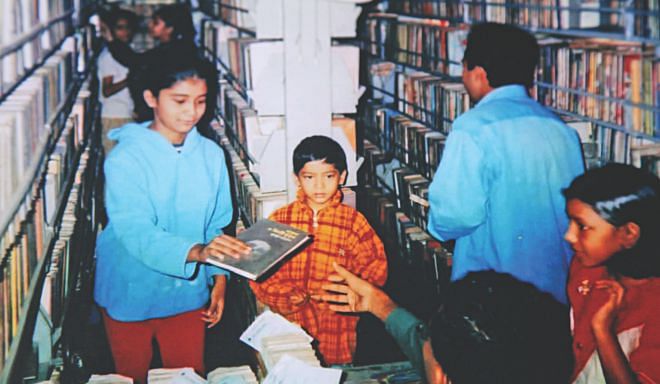Let there be light
Let there be light
Abdullah Abu Sayeed speaks on 35th anniversary of Bishwa Sahitya Kendra

Bishwa Sahitya Kendra (BSK), a study circle that was formed on this day in 1978, has snowballed over the last three decades and a half into a colossal initiative for a simple yet deeply profound cause -- reaching books to young readers, opening up the windows to their minds. Today, more than a million children are reached through the project every year throughout the country, to realise their motto “Alokito Manush Chai” (“Let us be enlightened”). On the occasion, Professor Abdullah Abu Sayeed -- the mastermind behind the movement -- spoke to The Daily Star.
How do you reflect on the impact BSK has had on the country's children?
Abdullah Abu Sayeed: See, the process of enrichment is a very gradual process, and moreover, it's an internal change. There is no way to 'measure' it outright. The way I look at it, I ask people to see if our members' voices have changed a little bit, if they are speaking a little differently. I believe if a person has been enriched by our project, it will reflect in the way he thinks, and the way he walks, talks and behaves. We have reached one million students last year, this year our target is a million and a half. In any case, though, I don't believe in results; I just believe in trying. It's the best we can do. However, I think the society somewhere reaps the benefits of any good thought or initiative. Like the poem by Robert Browning, (Abt Vogler): “All we have willed or hoped or dreamed of good shall exist; Not its semblance, but itself;”

If you have to look back personally at the journey, how does that make you feel?
Abdullah Abu Sayeed: Someone was telling me the other day that I have had a lot to struggle for in the last 35 years. I said “What struggle? I have enjoyed it! If it was a struggle, I could not have survived. I have seen development in children around me, and that has given me immense satisfaction.
Tell us the context of the inception of BSK, and the journey that followed.
Abdullah Abu Sayeed: This was a very different country back then. After partition of India, many Hindus who held Bangla culture in their hearts had left the country. And when we started in '78, it was not very different. There was a small middle class, and outside of it, everything was dark; no education, no light. Those were difficult times. Books were to be memorised to pass exams; it was difficult to convince people to read. We started as a study circle of 15 members, bought 10 books worth 35 taka, and the development we saw of members in the first five years, inspired us to extend it. We started it to 3500 students, and now we are targeting a million and a half this year. Maybe NGOs could have achieved this same growth in 3 years, but we never received their support. We never had the money. There's a saying in Bangla -- “Bhikkhuker Paye Lokkhi” (“The beggar's fortune is in his feet”), meaning the one who can walk the most, will gather the most success; so we have walked. And through that, we have attained some trust and confidence of people.
Do you think in this age of technology, the tendency of reading is diminishing?
Abdullah Abu Sayeed: I am not very concerned of it. 10% people in the world are incurably good people; 10% are incurably evil. Similarly, there is a reader class; they will read no matter what other distractions are there. Their developed brain will not be fulfilled by the 'lighter' elements of technology for long; they will return to books. Books sales have not decreased anywhere in the world.
But e-books have made inroads in recent years; any many libraries worldwide have switched to electronic reading media. What is your take on that?
Abdullah Abu Sayeed: It's natural; with the evolution of time, the format can change. When they were carved in stones, or written in papyrus, they were still books, and whatever the format is, the reader will have to read it.
I think the appeal of paper books will remain, though. E-books may be convenient for references or information, but for the leisurely reader, the connection to actual books will be unmatched. But it's true that e-books have greater accessibility. We are actually starting an online book reading campaign, to be launched very shortly, in association with Grameenphone.
You have reached out to so many young minds; how do you think their society -- of the future -- will look like?
Abdullah Abu Sayeed: It's difficult to predict. Society is a complex system, and how it will evolve cannot be predicted. But yes, while society will have an impact on them, I believe they will also have an impact on the society, and bring about positive changes in it. The society will probably not get a walkover. We cannot claim anything; we can just hope.